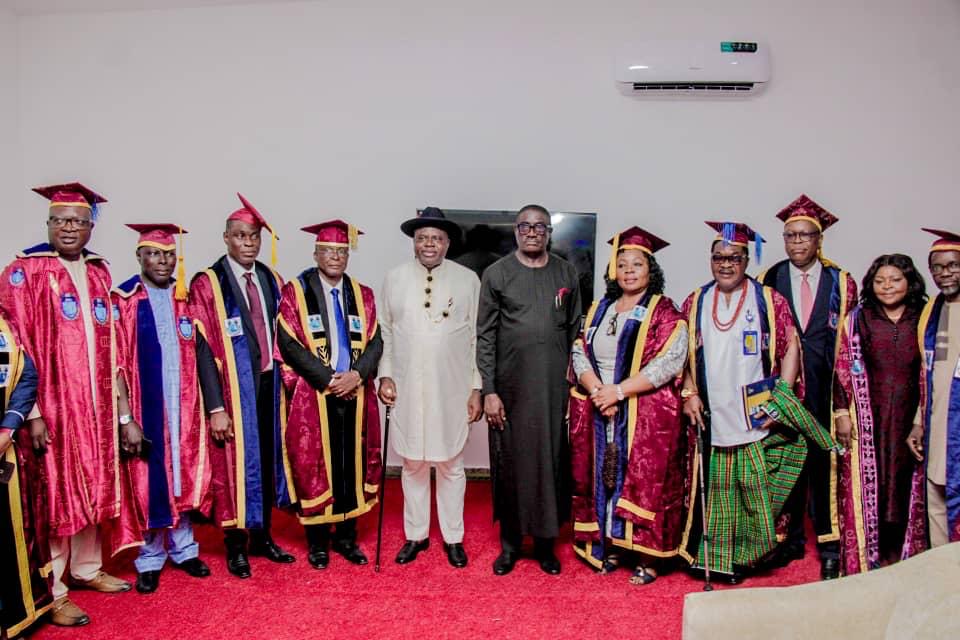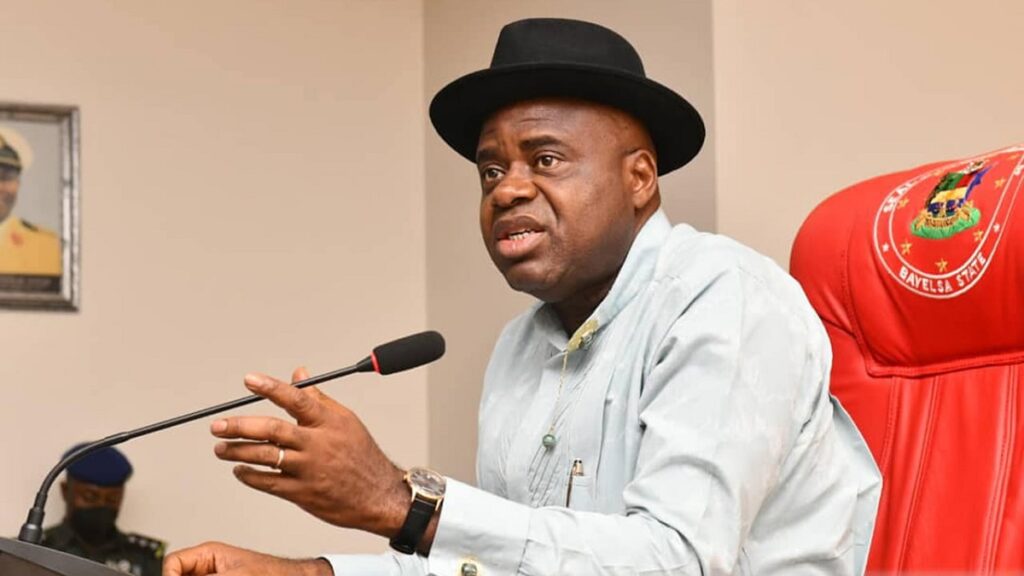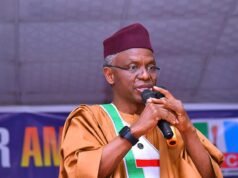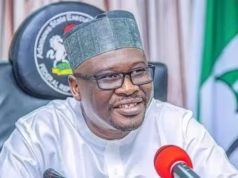Governor Douye Diri of Bayelsa State has issued a compelling call to action for Nigerian universities: to prioritise and champion made‑in‑Nigeria innovations by aligning academic curricula with the country’s technological and industrial realities. Speaking at a landmark convocation and anniversary event in Rivers State, Diri urged policymakers, educators, and researchers to transform their institutions into engines of homegrown innovation, research and vocational excellence.
Table of Contents

A Strategic Address at the University of Port Harcourt
Addressing graduates and academic leaders at his alma mater—the University of Port Harcourt in Choba, Rivers State—during the 35th convocation ceremony, which also marked the university’s golden jubilee lecture, Governor Diri highlighted a vision rooted in technological empowerment and pragmatic curriculum design. He noted that universities must forge stronger linkages between education, research and industry to break Nigeria’s dependence on imported everyday items—even toothpicks and pencil sharpeners, which he quipped are surprisingly still being imported due to outdated national mindsets.
He specifically challenged educational administrators at all tiers—basic, secondary, and tertiary—to conduct urgent curriculum reform that reflects the realities of the digital age. According to his spokesperson, Daniel Alabrah, Diri stressed that “universities must lead the way in research that optimises made‑in‑Nigeria inventions and products.”
From BayelsaPRIME to ICT Empowerment
Continuing his charge, the governor described the Bayelsa Promoting Reform to Improve and Modernise Education (BayelsaPRIME) initiative as foundational to his strategy. The programme, launched at the basic education level, introduces digital learning tools and modern IT training for teachers and students. He confirmed the state government also built an ICT hub in Yenagoa designed to empower citizens through digital literacy and skill development.
Funding, Partnerships, and a New Mindset
Governor Diri underscored that educational transformation requires more than words—it needs sustainable funding and strategic partnerships. He urged federal, state and local governments to honour their budgetary responsibilities to education, and called on private sector stakeholders, donor agencies, and interventionist groups to play their part in supporting academia’s growth and research capacity.
He was candid in his critique of what he termed “national arrogance,” the tendency to denigrate artisans and vocational trades, while exalting white-collar credentials over practical skills. This, he argues, is why Nigeria still imports basic goods that could be produced domestically. His address dared institutions to reframe the perception of artisanship and technical training, not as fallback options, but as engines of innovation.

Double Honour and a Housing Pledge
In addition to his impassioned speech on university innovation, Governor Diri announced a remarkable pledge to fund a new staff housing project at the University of Port Harcourt—his alma mater—further illustrating his commitment to educational infrastructure and faculty welfare.
According to press reports, Diri also received a double honour during the event, though details were not disclosed in full. It is presumed these honours were symbolic recognitions tied to his contributions to education and innovation in the Niger Delta region.
Aligning with Broader Science and Technology Priorities
Governor Diri’s recent summons to universities is consistent with his administration’s broader agenda to strengthen science, technology, engineering and mathematics (STEM) education across Bayelsa. Back in March 2025, he reaffirmed a state commitment to enhancing STEM instruction through improved teacher recruitment, increased investment in technical and vocational infrastructure, and oversight under the PRIME programme—refocusing education on science and innovation as national priorities.
Why This Matters
1. Domestic Innovation and Economic Value
Nigeria, despite its resource endowments, continues to lean heavily on imports, often for inexpensive, everyday items. By investing in curriculum reform and vocational training, universities can help reverse this trend, promoting domestic manufacturing, supporting SMEs, and capturing value-added close to home.
2. Bridging Theory with Industry
Governor Diri’s mandate points to a growing imperative: for higher education institutions to collaborate with industrial partners, translating academic research into practical, locally relevant products and marketable technologies.
3. Addressing the ‘Skills Gap’
Critically, Diri’s critique of undervaluing artisans and vocational skills resonates where Nigeria loses economic opportunities due to misplaced educational priorities. Elevating these disciplines in tertiary curricula can create a more balanced and market-ready workforce.
4. Supporting Educators
The proposed housing project indicates attention to professor retention and academic morale—vital ingredients in attracting and keeping qualified personnel who can drive innovation at universities.
Key Recommendations for Universities
1. Update Curriculum Regularly
Embed technology, digital literacy, vocational competencies and innovation labs into all levels of study—from foundational courses to professional training.
2. Strengthen Research Units
Support faculty and student-led projects aimed at producing tangible outputs like locally made tools, devices, materials or software.
3. Build Industry Partnerships
Establish collaborations with local businesses, artisans and manufacturers to pilot innovations and create internship or mentorship opportunities.
4. Promote Vocational-Technical Integration
Break down institutional silos: integrate vocational training into university programmes to value hands-on skills equally with academic pursuits.
5. Seek Multi-sector Funding
Take advantage of public-private partnerships, grants, donor-driven fellowships and government allocations to finance infrastructure and innovation hubs.
Impact and Prospects
If embraced, Diri’s vision has the potential to reshape Nigeria’s tertiary landscape. Universities positioned as innovation hotbeds could graduate not just thinkers, but inventors—fueling sectors like agriculture, light manufacturing, digital services, and renewable energy with homegrown talent.
Moreover, users of the innovations—craftspeople, traders, community developers—would benefit as well, leading to grassroots economic growth. Internally, institutions which adopt this approach will likely see heightened student engagement, increased research output, and stronger employability rates.

Looking Ahead
As the Bayelsa governor continues to emphasise education reform, Bayelsa State may emerge as a model for technology integration and curriculum innovation across Nigeria. With rivals such as Niger Delta University, Federal University Otuoke, and University of Africa at Toru‑Orua active in the region, the stage is set for collaborative regional progress in higher education.
Universities have a pivotal role—not only in crafting graduates, but in forging a nation built on innovation, self-reliance, and digital relevance. Governor Diri’s mandate invites them to lead that change.
Summary Table
| Area | Governor Diri’s Call |
|---|---|
| Innovation | Focus on made‑in‑Nigeria research and inventions |
| Curriculum | Update at all levels to reflect digital age and vocational skills |
| Funding | ICT hub in Yenagoa; staff housing at the University of Port Harcourt |
| Policy Mindset | Value artisans and vocational trades as innovation drivers |
| Infrastructure | ICT hub in Yenagoa; staff housing at University of Port Harcourt |
Governor Diri’s message is clear: if Nigerian universities want to remain relevant, they must become active incubators of local innovation and anchor education firmly in the realities of a technology-driven world.
Join Our Social Media Channels:
WhatsApp: NaijaEyes
Facebook: NaijaEyes
Twitter: NaijaEyes
Instagram: NaijaEyes
TikTok: NaijaEyes
READ THE LATEST EDUCATION NEWS





